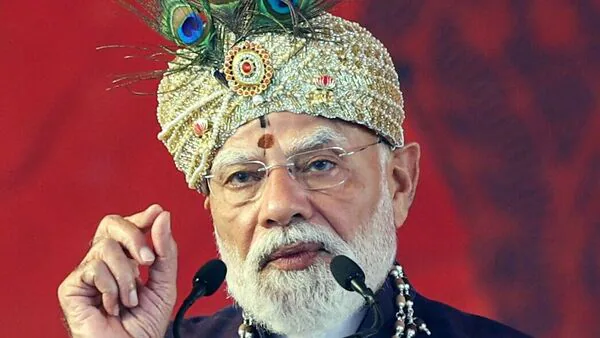
Dharmo Rakshati Rakshitaha- PM Modi Says New India Will Not Hesitate Against Terror Cites Op Sindoor, Gita Ideals
Addressing thousands gathered in the temple town of Udupi for the Laksha Kantha Gita Parayana, where one lakh devotees recited the Srimad Bhagwad Gita, the Prime Minister interwove national security, spiritual philosophy and governance principles in a wide-ranging address.
Why did PM Modi invoke national security at a spiritual gathering?Modi said the essence of national security lies in collective harmony combined with an unwavering commitment to protecting citizens.
“Previous governments used to sit idle after terror attack but new India neither bows nor hesitates from protecting its people,” he said, adding that the teachings of the Gita emphasise peace but also the duty to defeat perpetrators of violence.
Also Read | PM Modi joins over 100,000 devotees in mass recitation of the Bhagavad GitaHe linked his remarks to the Pahalgam terror attack in April, in which 26 people - including several from Karnataka - were killed. Modi said the country“saw the government's resolve” during Operation Sindoor, the military response involving precision strikes on terror launchpads in Pakistan.
“We give Krishna's message of compassion from Red Fort and also announce Mission Sudarshan Chakra,” he said, explaining that the initiative provides a protective security grid around key industrial, public and strategic locations.
How did Modi connect the Gita to governance and policy?Modi framed the Gita as a timeless guide to ethical governance.
“Gita teaches us to strive for peace and truth and also the need to crush perpetrators of atrocities. We believe in Vasudhaiva Kutumbakam...and also recite 'Dharmo Rakshati Rakshitaha',” he said, suggesting that his administration's policy frameworks draw directly from its principles.
He argued that teachings on welfare and duty influence central programmes, noting:
“Lord Sri Krishna tells us in Gita to work for public welfare. Slogans like 'Sabka Saath Sabka Vikas' and 'Sarvajan Hitaya' are inspired by the verses of Gita. It tells us to help poor which helped us lay foundation for policies like Ayushman and PM Awaas Yojana.”
Also Read | PM Modi hosts Indian Blind Women's T20 World Cup winnersModi also linked women's safety and empowerment to the scripture:
“The lessons on women safety and women empowerment from the life of Bhagwad Gita guided the Centre to formulate 'Naari Shakti Vandan Adhiniyam'.”
What was the significance of Udupi for PM Modi's visit?The Prime Minister praised Udupi's historic role in shaping models of sanitation and water governance, saying the town pioneered systems“five decades ago” that later informed national policy. He also lauded the late Swami Vishwesha Teertha of Pejavara Math, describing him as a pivotal figure in the Ram Janma Bhoomi movement.
Modi reminded the audience that Udupi shares a spiritual connection with Ayodhya, where a special arch dedicated to Sri Madhwacharya has been installed at the newly built Ram temple.
How did PM Modi participate in the temple rituals?Before the public event, Modi visited Kanaka Mantap, offering floral tributes to Kanakadasa, the saint-philosopher whose legendary devotion is linked to the westward turn of Krishna's idol at the Udupi Sri Krishna Temple.
He later joined the Laksha Gita Pathana alongside seer Sugunendra Thirtha, Karnataka Governor Thawarchand Gehlot and senior Math officials, reciting hymns with the congregation.
Also Read | PM Modi to unveil Asia's 'tallest' statue of Lord Ram in Goa todayUpon entering the temple precincts, Modi received a Poorna Kumbh swagatham, and was presented with a silver-clad Tulasi japa maala and traditional Mudras used in Madhwa rituals.
How did Udupi welcome PM Modi?The Prime Minister's arrival was marked by a grand roadshow from Mangaluru Airport to Udupi. Standing on the running board of his vehicle, he waved to crowds who showered flower petals over the convoy; Modi reciprocated in kind. Saffron decorations, BJP flags and cultural performances lined the streets, creating a festive atmosphere throughout the coastal town.
Modi's visit also revived memories of his 2008 trip to the same temple when he was Chief Minister of Gujarat - a moment he noted with fondness, particularly as the same seer, Sugunendra Thirtha, remains the head of the Krishna Math.
Legal Disclaimer:
MENAFN provides the
information “as is” without warranty of any kind. We do not accept
any responsibility or liability for the accuracy, content, images,
videos, licenses, completeness, legality, or reliability of the information
contained in this article. If you have any complaints or copyright
issues related to this article, kindly contact the provider above.

















Comments
No comment